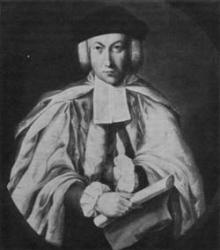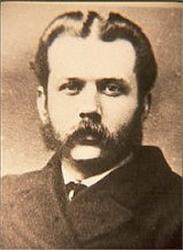Planning worship?
Check out our sister site, ZeteoSearch.org,
for 20+ additional resources related to your search.
- |
User Links
Person Results
William Hayes

1706 - 1777 Person Name: Dr. W. Hayes Composer of "[It is a good thing to give thanks]" in The Hymnal, Revised and Enlarged, as adopted by the General Convention of the Protestant Episcopal Church in the United States of America in the year of our Lord 1892 William Hayes (26 January 1708 (baptised) – 27 July 1777) was an English composer, organist, singer and conductor.
Hayes was born in Gloucester. He trained at Gloucester Cathedral and spent the early part of his working life as organist of St Mary’s, Shrewsbury (1729) and Worcester Cathedral (1731). The majority of his career was spent at Oxford where he was appointed organist of Magdalen College in 1734, and established his credentials with the degrees of B.Mus in 1735 and D.Mus in 1749. (He was painted by John Cornish in his doctoral robes around 1749.) In 1741 he was unanimously elected Professor of Music and organist of the University Church. He presided over the city’s concert life for the next 30 years, and was instrumental in the building of the Holywell Music Room in Oxford in 1748, the oldest purpose-built music room in Europe. He was one of the earliest members of the Royal Society of Musicians, and in 1765 was elected a ‘privileged member’ of the Noblemen’s and Gentlemen’s Catch Club. He died in Oxford, aged 69.
William Hayes was an enthusiastic Handelian, and one of the most active conductors of his oratorios and other large-scale works outside London. His wide knowledge of Handel left a strong impression on his own music, but by no means dominated it. As a composer he tended towards genres largely ignored by Handel—English chamber cantatas, organ-accompanied anthems and convivial vocal music—and his vocal works show an English preference for non-da capo aria forms. Hayes also cultivated a self-consciously ‘learned’ polyphonic style (perhaps inspired by his antiquarian interests) which can be seen in his many canons, full-anthems, and the strict fugal movements of his instrumental works. Nevertheless, several of his late trio sonatas show that he was not deaf to newly emerging Classical styles. Although he published virtually none of his instrumental music, his vocal works were extremely popular, and the printed editions were subscribed to by large numbers of amateur and professional musicians. Substantial works like his ode The Passions, the one-act oratorio The Fall of Jericho, and his Six Cantatas demonstrate that Hayes was one of the finest English composers of the eighteenth century.
As a writer, his Art of Composing Music includes the first published description of aleatoric composition—music composed by chance—albeit deliberately satirical in intent. In his Remarks he reveals much about his aesthetic outlook: in particular that he valued the music of Handel and Corelli over that of Rameau, Benedetto Marcello and Geminiani. Finally, the Anecdotes offer insights into the organization of provincial music festivals in the mid-eighteenth century. Hayes bequeathed his important and wide-ranging music library to his son Philip Hayes; the manuscripts of both father and son eventually passed to the Bodleian Library, Oxford, in 1801.
Sacred works
The Fall of Jericho, oratorio, c. 1740–50
Sixteen Psalms (London, 1773)
David, oratorio, completed by Philip Hayes
around 20 anthems and service music, in Cathedral Music in Score, edited by Philip Hayes (Oxford, 1795)
--en.wikipedia.org/wiki
William Hayes
Alfred Bennett
1805 - 1830 Person Name: A. Bennett Composer of "[It is a good thing to give thanks] (Bennett)" in The Church Hymnal Alfred Bennett, Born in Chichester, England, 1805, died in Oxford, 1830. Organist, son and pupil of Thomas Bennett. He became organist of New College, Oxford, and of the University in 1825, and received the degree of Mus. Bac. Works: Church Services and anthems; Chants (with William Marshall, 1829); Songs.
Cyclopedia of Music and Musicians by John Denison Camplin, Jr. and William Foster Apthorp (Charles Scribner’s Sons, 1888)
https://archive.org/details/cyclopediaofmusi01cham/mode/2up
Alfred Bennett
John Naylor
1838 - 1897 Person Name: J. Naylor Composer of "[It is a good thing to give thanks unto the Lord]" in The Hymnal of the Protestant Episcopal Church in the United States of America 1940
John Naylor
Charles William Corfe
1814 - 1883 Person Name: C. W. Corfe Composer of "[It is a good thing to give thanks unto the Lord: and to sing praises unto thy name, O Most High]" in University Hymns
Charles William Corfe
William Felton
1715 - 1769 Person Name: Rev. W. Felton Composer of "[It is a good thing to give thanks]" in The Hymnal, Revised and Enlarged, as adopted by the General Convention of the Protestant Episcopal Church in the United States of America in the year of our Lord 1892
William Felton
Phocion Henley
1728 - 1764 Person Name: P. Henley Composer of "[It is a good thing to give thanks] (Henley)" in The Church Hymnal
Phocion Henley
John Alcock

1715 - 1806 Person Name: J. Alcock Composer of "[It is a good thing to give thanks] (Alcock)" in The Church Hymnal John Alcock, doctor of music, was born in London, April 11, 1715; he composed songs, church music, glees, anthems, instrumental music, chantes, etc., and obtained the prize at the Catch Club; died at Lichfield, 1806, aged 91.
A Dictionary of Musical Information by John W. Moore, Boston: Oliver, Ditson & Company, 1876
John Alcock
A. Goldwin
Composer of "[It is a good thing to give thanks] (Goldwin)" in The Church Hymnal
A. Goldwin
Philip Armes

1836 - 1908 Person Name: Dr. Armes Composer of "[It is a good thing to give thanks unto the Lord]" in The Church Service Book Philip Armes, born in Norwich,England, Aug. 15, 1836. Organist; chorister in Norwich Cathedral in 1846-48, and in Rochester Cathedral 1848-51; articled pupil of Dr. John Larkin Hopkins at Rochester, 1850-55; was organist of Trinity Church, Milton, Gravesend in 1855-57, at St. Andrew's, Wells Street, London, in 1857-61, of Chichester Cathedral in 1861-62, and of Durham Cathedral since 1862. Mus. Bac., Oxford 1858; Mus. Doc., Oxford, 1865. degrees also from University of Durham, 1863-1864. Works: Hezekiah, oratorio, performed at Worcester Festival, 1878; St. John the Evangelist, do., York Festival 1881; Communion Services in A; do. in B-flat; Te Deum; Morning and Evening Service in G; Anthems; Chants; Hymns, etc.
Cyclopedia of Music and Musicians by John Denison Camplin, Jr. and William Foster Apthorp (Charles Scribner’s Sons, 1888)
Philip Armes
William Crotch

1775 - 1847 Composer of "[It is a good thing to give thanks unto the Lord]" in Hymns of the Spirit for Use in the Free Churches of America William Crotch (5 July 1775 – 29 December 1847) was an English composer, organist and artist.
Born in Norwich, Norfolk to a master carpenter he showed early musical talent as a child prodigy. The three and a half year old Master William Crotch was taken to London by his ambitious mother, where he not only played on the organ of the Chapel Royal in St James's Palace, but for King George III. The London Magazine of April 1779 records:
He appears to be fondest of solemn tunes and church musick, particularly the 104th Psalm. As soon as he has finished a regular tune, or part of a tune, or played some little fancy notes of his own, he stops, and has some of the pranks of a wanton boy; some of the company then generally give him a cake, an apple, or an orange, to induce him to play again...
Crotch was later to observe that this experience led him to become a rather spoiled child, excessively indulged so that he would perform.
He was for a time organist at Christ Church, Oxford, from which he was later to graduate with a Bachelor of Music degree.
His composition The Captivity of Judah was played at Trinity Hall, Cambridge, on 4 June 1789; his most successful composition in adulthood was the oratorio Palestine (1812). He may have composed the Westminster Chimes in 1793.
In 1797 Crotch was given a professorship at Oxford University, and in 1799 he acquired a doctorate in music. While at Oxford, he became acquainted with the musician and artist John Malchair, and took up sketching. He followed Malchair's style in recording the exact time and date of each of his pictures, and when he met John Constable in London in 1805, he passed the habit along to the more famous artist.
In 1834, to commemorate the installation of the Duke of Wellington as chancellor of the University of Oxford, Crotch penned a second oratorio titled The Captivity of Judah. The 1834 work bears little resemblance to the oratorio he wrote as a child in 1789.
In 1822, Crotch was appointed to the Royal Academy of Music as its first Principal, but resigned ten years later.[2] He spent his last years at his son's house in Taunton, Somerset, where he died suddenly in 1847. Among his notable pupils were William Sterndale Bennett, Lucy Anderson, Stephen Codman, George Job Elvey, Cipriani Potter, and Charles Kensington Salaman
--en.wikipedia.org/
William Crotch


 My Starred Hymns
My Starred Hymns

